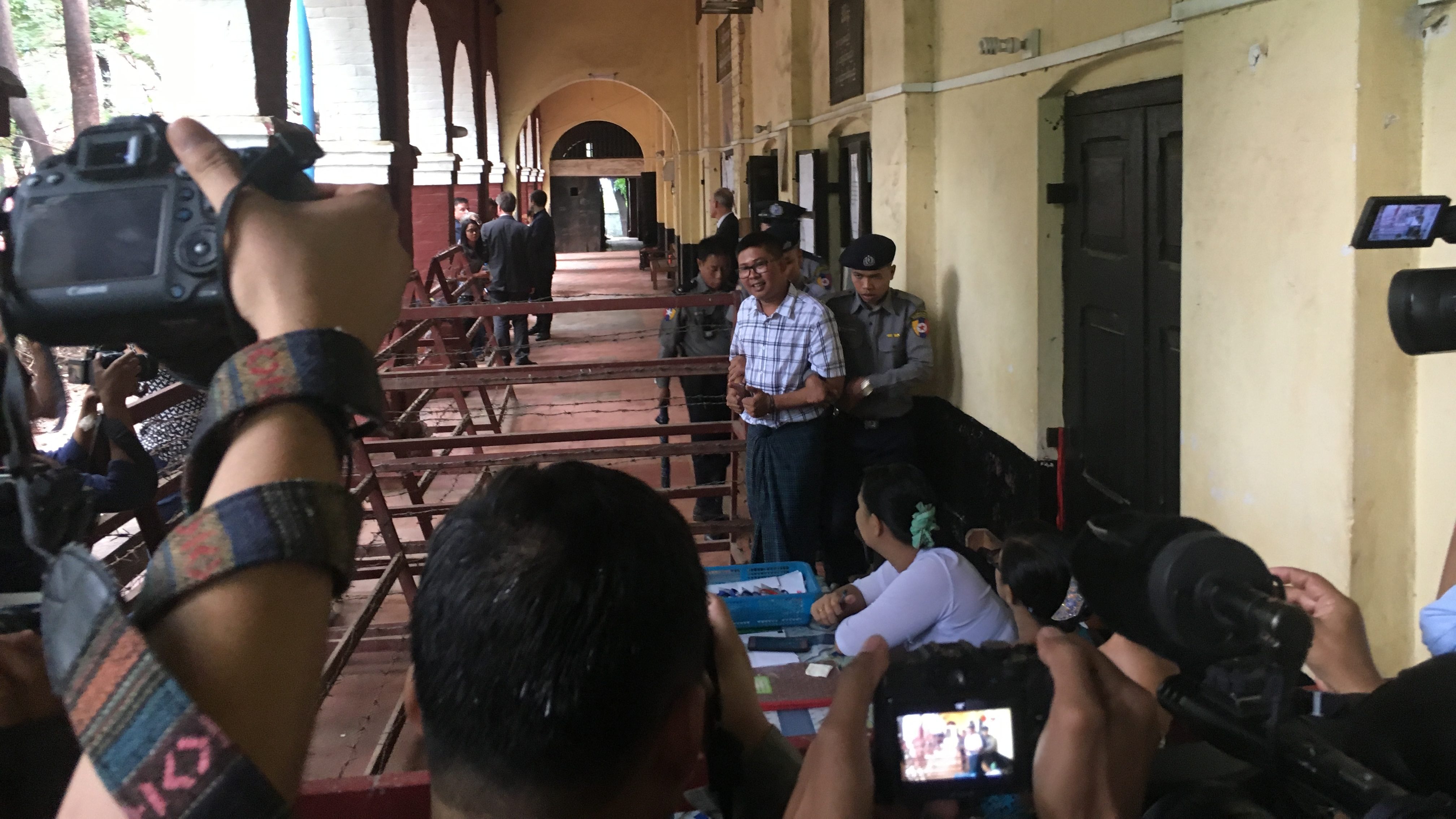For two weeks in December, Yangon police placed hoods over the heads of Reuters reporters Wa Lone and Kyaw Soe Oo while transporting them to a secret facility notorious for its use by Burmese authorities in torturing political prisoners. Once there, the reporters were kept awake for days at a time while they were interrogated.
“I saw the markings on the cell walls left by political dissidents and political prisoners, back from 1988 up to the present day, about how they were imprisoned, how long they were imprisoned,” Wa Lone told reporters after his second day of testimony at the Insein Township courthouse yesterday. “I’ve personally written on those walls how long I was there in that cell and why I was captured.”
According to his testimony that day, the interrogators at the infamous detention site known as Aung Tha Pyay had no interest in the “secret documents” police had accused Wa Lone and fellow reporter Kyaw Soe Oo of possessing. Instead, the questions all focused on the reporters’ investigation of the military massacre of 10 Rohingya men and boys in the village of Inn Din in September.
“Throughout the interrogation, [police] didn’t show any interest in the secret documents found on us. They only asked about our reporting on Maungdaw, Rakhine,” Wa Lone said during his cross-examination.
The lack of interest in the documents during the interrogation is just one part of Wa Lone’s story that challenges the prosecution’s claims. According to the prosecution, Wa Lone sought a meeting with police officer Naing Lin on the evening of Dec. 12, 2017, and he was arrested along with Kyaw Soe Oo during a routine traffic stop while they were one their way home from the meeting when police found government documents in their possession.
Wa Lone’s testimony, however, presented an account in which Naing Lin insisted on having the meeting at a restaurant on the outskirts of Yangon that evening, handed the reporters the documents, and pressured them to take photos of them. Wa Lone also described how he and Kyaw Soe Oo were arrested minutes after receiving the documents by police waiting for them as they exited the restaurant. He said the officers began referring to the documents as “secret” before even examining them.
“It was like they already knew,” Wa Lone told the court.
Wa Lone’s telling of that night’s events matches that of former police officer Moe Yan Naing, who told the court in April that a senior police official instructed all of the police officers who had given information to Wa Lone about the Inn Din massacre to “get” him. Naing Lin stepped up to set the trap because Wa Lone had not met him in person yet. Moe Yan Naing has since been sentenced to a year in prison for talking to the reporter.
According to defense attorney Than Zaw Aung, yesterday’s testimony charts a course for the remainder of the proceedings, during which the defense team will continue to try to disprove the prosecution’s version of the events of Dec. 12. This will include further attempts to submit phone records as evidence that Naing Lin – not Wa Lone – initiated the meeting that night. Judge Ye Lwin rejected the records during this week’s hearings.
“The advantages of Wa Lone’s testimony are that he stated that Naing Lin gave them these documents. They didn’t know what the documents were when they received them. They were immediately arrested outside the restaurant,” the lawyer said. “[Wa Lone] said that he believes they were arrested and charged because of the Inn Din case. [Police] didn’t even ask any specific questions about the documents.”
When asked what he believes is the defense’s strongest piece of evidence, Than Zaw Aung told Coconuts: “We have submitted 24 exhibits. Among those 24 documents are several newspaper clippings that say the ‘secret papers’ from the prosecution side had already been published [before the reporters’ arrest] and were known to the public.”
The lawyer also acknowledged the challenge of defending clients whom much of the public and even some government officials believe to be guilty of a treasonous act. If convicted under the Official Secrets Act, the two reporters face up to 14 years in prison.
“There have been a lot of interviews relating to the case from government officials and from the police side. I am concerned that the case can be influenced in that way,” Than Zaw Aung said. “But if the court is independent, the judge can think freely and independently about that case.”
When asked if he trusts judge Ye Lwin, who has been presiding over the case since it began in January, the lawyer said: “Yes, I trust this judge.”





Reader Interactions